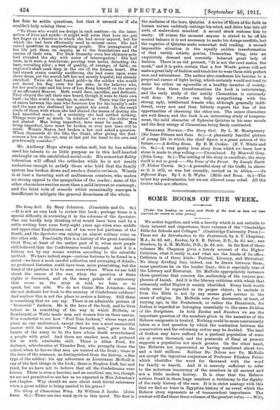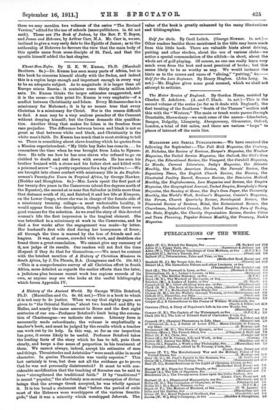SOME BOOKS OF THE WEEK.
[Under this heading we notice such Books of the week as hays not teem reserved for review in other forms.] We notice together, and with a brevity which is not suitable to their interest and importance, three volumes of the " Cambridge Bible for Schools and Colleges." (Cambridge University Press.)— These are An Introduction to the Pentateuch, by A. T. Chapman, MA., 3s. 6d. net ; Exodus, by S. R. Driver, D.D., 3s. 6d. net ; and Numbers, by A. H. McNeile, D.D., 2s. 6d. net. In the first of these volumes Mr. Chapman gives a timely account of the Higher Criticism, what it really is, and what are the limits of its office- Criticism is of three kinds : Textual, Literary, and Historical. No sharp dividing line, indeed, can be drawn between them ; some questions lie on the border lines ; this is especially true of the Literary and Historical. Dr. McNeile appropriately instances those questions that concern the authorship of the various pro- phecies of Isaiah. And it is the literary criticism with which that commonly called Higher is mainly identified. Every book worth study must be regarded as its proper object; to exclude it from the Bible is not by any means good service to the cause of religion. Dr. McNeile sees four documents at least, of varying age, in the Pentateuch, or rather the Hexateuch, for Joshua is regarded as belonging essentially to _the same division of the Scriptures. In both Exodus and Numbers we see the important question of the numbers given in the narrative of the Hebrew emigrants is treated. Nothing could be more conveniently taken as a test question by which the contention between the conservative and the reforming critics may be decided. The land of Goshen may have sufficed for a pastoral population of some six or seven thousand, and the peninsula of Sinai at present supports a population not much greater. On the other hand, the Hebrews are represented as having numbered about two and a half millions. Neither Dr. Driver nor Dr. McNeile can accept the ingenious conjecture of Professor Flinders Petrie which identifies the word for thousand with the word' for family or hearth. And it is scarcely sufficient to refer to the notorious inaccuracy of the numbers in all ancient and not a little modern history. It is clear that the Hebrew writers found in these huge numbers a testimony to the dignity of the early history of the race. It is in strict analogy with this that we find no trace in Egyptian history of an event which the Hebrew story represents as of transcendent importance. The student will find these throe volumes of the greatest value. —Wit4 them we may mention two volumes of the series " The Revised Version," edited for the use of schools (same publishers. ls. 6d. net each). These are The Book of Joshua, by the Rev. P. T. Boyer, and James and Hebrews, by Arthur Carr, M.A. Mr. Carr is, we see, inclined to give a very early date to the Epistle of James; as to the authorship of Hebrews he favours the view that the main body of this epistle came from some disciple of St. Paul, and that the apostle himself added the last chapter.











































 Previous page
Previous page